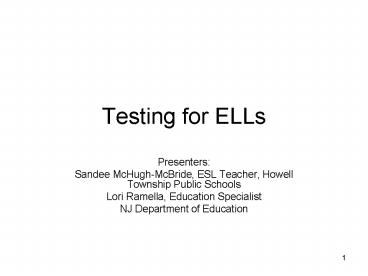Testing for ELLs PowerPoint PPT Presentation
1 / 25
Title: Testing for ELLs
1
Testing for ELLs
- Presenters
- Sandee McHugh-McBride, ESL Teacher, Howell
Township Public Schools - Lori Ramella, Education Specialist
- NJ Department of Education
2
Purposes of Language Proficiency Testing
- Available tests
- http//www.nj.gov/education/bilingual/resources/pr
of_tests.htm - Placement decisions
- Eligibility/entrance
- Exiting
3
Test Options
- ACCESS for ELLs
- W-APT
- MODEL
- IPT
- LAS
- LAS Links
- MAC II
- CELLA
- http//www.nj.gov/education/bilingual/resources/pr
of_tests.htm
4
Additional Options for Kindergarten
- W-APT
- MODEL
- ACCESS for ELLs
5
New Kindergarten ACCESS for ELLs
- purposes
- advantages
- comments http//www.surveymonkey.com/s.aspx?smJh
tY4cCOebKmKX92UgDagw_3d_3d
6
Administering the K ACCESS for ELLs
- What is the test measuring?
- How does it relate to the WIDA Standards?
- How does it connect to the curriculum?
7
Old vs. New K ACCESS for ELLs
- Activity Examine the old and new K score report
with a partner. Compare and contrast them. - What are the advantages of the new K score report?
8
New Kindergarten ACCESS for ELLs
- Scale scores range from 100-600
- 2 proficiency level scores on teacher report
- Instructional
- Accountability
- Maximum composite score 6.0
9
W-APT vs. ACCESSfor ELLs Similarities
- Assessment domains listening, speaking, reading,
writing - Standards addressed all 5 WIDA Standards
- Kindergarten test individually administered and
adaptive - Format of speaking test individually
administered and adaptive - Format of listening and reading test multiple
choice - Format of writing test constructed response
10
W-APT vs. ACCESSfor ELLsDifferences
11
Types of Scores
12
Raw Scores
- Number of items student answered correctly
- Least valuable in monitoring growth
- Not directly comparable across grades or tiers
- Level of difficulty varies from item to item
13
Scale Scores
- WIDA ACCESS for ELLs Scale Scores are
transformations of raw scores. - Range from 100 to 600 (above 500 is rare)
- Scale scores are ideal for tracking growth
- Vertically-equated scale applies to all grades
and all test forms can be compared across grades
and tiers and within language domains, but not
across them - Scale scores do take age differences into
account assessment tasks taken by students in
the grade 9-12 cluster are more challenging than
the assessment tasks taken by students in the
grade 1-2 cluster
14
Levels of English Language Proficiency
15
Performance Definitions
16
CAN DO Descriptors
- Show what ELLs can do in a particular language
domain - Give samples of the language expectations of ELLs
across the continuum of language development - Can be used as a standards-based resource tool
and in conjunction with the WIDA Standards - Are specific to grade-level clusters (Pre-K-K
1-2 3-5 6-8 9-12) - Are particularly useful for assisting
content/mainstream teachers with interpretation
of ELL students ELP levels - Can be applied across the 5 WIDA Standards
17
Proficiency Level Scores
- An interpretation of scale scores
- Ideal for describing student performance in terms
of the 6 WIDA language proficiency levels - Scores are used to help inform exiting decisions
- Scores are represented by whole numbers and a
decimal (e.g., 4.3)
18
ACCESS for ELLs Scores
19
Overall Composite Score
20
Scores Received Student Level (Summary)
- Each student also receives a scale score and a
proficiency level for Oral Language, Literacy,
Comprehension, and Overall Composite.
21
Examining Score Reports for Instruction
- Jigsaw activity
- Select one of the sample score reports (parent,
teacher, student roster, school frequency,
district frequency). - Work with a partner to answer the following
- What is the purpose of the report?
- What data are available?
- How can you use the data?
- What are the implications for instruction?
- Which scores might best inform instruction?
22
Jigsaw
- Now jigsaw back into the whole group and share
what you learned about the score report examined.
23
Relating the Standards to the Assessment
Sample ACCESS for ELLsTest Items (Summative
Framework)
24
(No Transcript)
25
References
- Kindergarten ACCESS for ELLs MODEL Training
DVD - 2008-09 ACCESS for ELLs Training Toolkit
- Interpretation of ACCESS for ELLs Score
Reports, Don Bouchard, September 2008 - www.nj.gov/education/bilingual
- www.wida.us
- WIDA Focus on Growth, Volume 1 Issue 1, March 11,
2009 - smcbride_at_howell.k12.nj.us lori.ramella_at_doe.state.n
j.us

